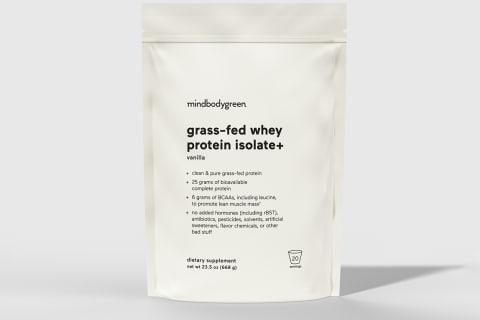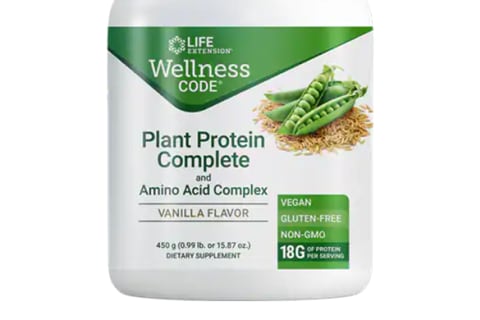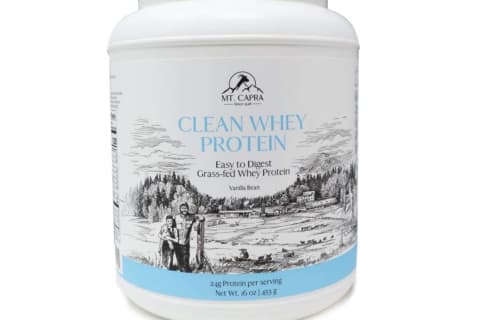Advertisement
Is Protein Powder Good For You? Pros, Cons & The Healthy Way To Use It


Protein powder is a popular supplement among athletes and fitness enthusiasts, but it's not without controversy. Some swear by its benefits for muscle building and recovery, while others question its safety and long-term effects on health.
So, is protein powder good for you? We spoke with a handful of nutrition experts to get a consensus on the science behind protein powder and examine the potential benefits and risks of using supplemental protein in order to answer this question once and for all.
What is protein powder, and how is it made?
Protein powders are made by extracting protein from various sources such as milk, soy, or peas using heat or enzymes. The extracted protein is dried and powdered for use as a supplement.
Some protein powders are minimally processed (hemp), while others are more processed (whey hydrolysate). That doesn't always mean one is better than the other. In the case of whey hydrolysate, the extra processing allows the protein's amino acids to be absorbed faster in the body. Likewise, whey isolate is more processed than whey concentrate in order to make the final product virtually lactose-free and easier on sensitive stomachs.
While it depends on the product, an average serving of whey protein powder contains about 120 calories and 25 grams of protein. Vegan protein powders can contain anywhere from 15 grams of protein to 25 or more grams per serving when using a blend of two or more plant protein sources.
Protein powder is often used as a convenient tool to help people reach their daily protein needs (over 100 grams a day for most people).
The most common types of protein powder
There are many different types of protein powder, but here's a list of the most common types you'll come across:
- Whey (isolate, concentrate, or hydrolysate)
- Casein
- Pea
- Hemp
- Egg or egg white
- Cricket
- Soy
- Rice
- Plant-based blends (a combination of two or more plant proteins)
- Beef protein
A note on collagen
Benefits
Here are some of the top science-backed benefits of protein powder:
It helps people of all ages build and maintain muscle mass.
Athletes and fitness enthusiasts know how important protein intake is for muscle repair and growth1. But it's not just athletes who should be concerned with maintaining muscle mass.
"Protein that is too low could result in loss of muscle, which could lead to a slower metabolism2 and less ''body armor,'" says celebrity trainer Don Saladino, with body armor being protection from falls that can happen later in life3. More than one in four people over the age of 65 years fall each year. Without adequate muscle, you are more susceptible to bone fractures4 following a fall—a major cause of mortality in older age.
Getting enough protein can also help reduce your likelihood of developing sarcopenia—severe age-related loss of muscle mass and function that leads to a higher risk of disability, disease, and mortality.
While it's totally possible to get all the muscle-supporting protein you need from whole foods, protein powders can help fill in gaps.
"It has been proven by multiple studies that protein powders can help to increase lean muscle mass5, especially when combined with resistance training," says dietitian Brittany DeLaurentis, MPH, R.D., CSO, L.D. "This holds true for whey-based protein powders, rice-based protein powders, and soy-based protein powders. However, most research has been conducted focusing on whey-based protein powders."
It may help with weight loss.
Contrary to the myth that too much protein makes you gain weight, several studies6 suggest that higher dietary protein intake may enhance fullness or satiety, especially among individuals who are overweight or obese. If you've ever eaten a meal with a lot of protein, you've likely experienced this for yourself.
However, there is mixed data on whether protein supplements suppress appetite. One study7 found that whey protein powder did not suppress appetite when taken 30 minutes before food, but casein and pea did. Other studies have found the opposite. Whey protein reduced self-rated appetite8 in lean, healthy men more than meals with tuna, turkey, or egg. Whey protein taken before a meal also reduced food intake9 in a randomized controlled trial of healthy young adults.
While more research is needed on the role supplemental protein plays in appetite reduction10, protein powders might decrease total food intake11 and contribute to body fat loss over time.
Here is a complete guide to using protein powder for weight loss.
It can help you reach your calorie goals.
"Making a beverage with protein powder can make it easier for those experiencing low appetite and those who have very high energy demands keep up with eating enough," says performance dietitian and consultant Kelly Jones, M.S., R.D., CSSD. "However, just using the protein powder isn't enough on its own, and it's important to always pair it with adequate carbohydrates and fat while ensuring the total portion consumed is adequate for you as an individual for a meal or snack."
Protein powder can also be helpful for those undergoing certain medical treatments. Appetite loss can be a side effect of cancer treatments, for example. Liquid nutrition, like smoothies made with protein powder, can make it easier to eat, stay hydrated, and consume more calories.
Of course, you should always check in with your doctor before changing your diet while undergoing treatment for an underlying disease.
It may be beneficial for preventing and managing metabolic conditions.
Metabolic syndrome increases your risk of developing chronic diseases like Type 2 diabetes, heart disease, and stroke. Whey protein powder has been shown to play a role in the prevention and management of metabolic syndrome12.
In a meta-analysis of nine randomized control trials13, whey protein supplementation improved body weight, total fat mass, and several cardiovascular disease risk factors in individuals who were overweight or obese.
Some clinical trials are also starting to investigate the effects of plant-based proteins on blood glucose, insulin, and hypertension14. Hemp and soy protein may lower blood glucose and insulin concentrations15 after a meal when compared to a carbohydrate control.
"Increasing one's protein intake is important while managing Type 2 diabetes16 because protein slows down absorption in your body," adds DeLaurentis. "Slower absorption allows your blood sugar17 to spike less high, less quickly. Increasing lean muscle mass with protein powders can also help with insulin resistance18."
It may help pregnant people hit their protein targets.
During pregnancy, there is an increased need for protein. Eating enough protein (or calories in general) can be difficult, especially if you're dealing with nausea and vomiting or have food aversions.
"As your baby (and body) grow throughout pregnancy, your protein needs increase19, making it more challenging to meet those needs through whole foods alone. Adding a protein powder supplement can help women meet their increased protein needs throughout pregnancy," says Jamie Adams, M.S., RDN, a prenatal dietitian and women's health expert.
In a meta-analysis of 16 studies20, protein supplementation led to a 34% lower risk of low gestational weight, 32% lower risk of low birth weight, and 38% lower risk of stillbirth.
"Many protein powders are an excellent addition to a healthy pregnancy," adds dietitian Molly Snyder, RDN. "I personally used protein powder on a regular basis for both of my pregnancies."
Downsides of protein powder
Supplementing with protein powder has a lot of health benefits, but that doesn't mean there aren't any potential drawbacks:
It may cause digestive issues.
Some people may experience digestive issues such as bloating, gas, and stomach cramps when consuming protein powder, particularly if they are sensitive to the ingredients in the product.
It may exacerbate kidney and liver damage when consumed in large amounts.
Those with existing kidney and liver conditions need to be careful about how much protein they consume. However, multiple review articles21 indicate high protein intakes don't pose health risks in otherwise healthy individuals without preexisting liver or kidney conditions.
There are some quality concerns.
Not all protein powders are created equal, and some may contain added sugars, fillers, or potentially unhealthy contaminants.
Plants also naturally accumulate heavy metals from the soil they are grown in, which is why vegan protein powders sometimes have elevated levels of arsenic, cadmium, lead, or mercury22. A study of 134 top-selling protein powders from the Clean Label Project found that certified organic products averaged twice as many heavy metals.
It should be noted that similarly high heavy metal levels from a Consumer Reports analysis were found after testing three servings of protein powder per day. The typical protein powder intake would likely not have adverse health effects due to heavy metals22 if consumed in moderation. But if this concerns you, consider using a protein powder derived from animal sources.
Looking for products that are third-party tested for purity and potency and researching the brand's transparency will help you find the safest option.
Common misconceptions:
Myth 1: Protein powder makes you gain weight.
Protein powder can help you build muscle mass, but protein powder in and of itself does not cause weight gain. Eating excess calories does.
Myth 2: Protein powder can replace whole foods.
Whether you choose plant-based protein powders or those derived from animal sources, they can't provide all the nutrients that whole foods do and should not replace other dietary protein sources or make up the bulk of your protein intake.
"Protein powder supplements, of any kind, should be just that—supplemental to a whole food diet," says dietitian nutritionist Nichole Dandrea-Russert, M.S., RDN. "Consuming a wide variety of whole foods to get your protein intake is important since a wide variety of foods contain a wide variety of nutrients."
Myth 3: Only bodybuilders need protein powder.
Protein is an essential nutrient for building and repairing tissues, maintaining muscle mass, and supporting overall health. Protein powder is a convenient and effective way for anyone to increase their protein intake, whether they are bodybuilders or not.
"As human beings, it is important to have muscle. But the misconception is that building muscle means you're going to look like a bodybuilder," says Saladino.
Myth 4: Protein powder is unsafe for pregnancy.
Protein powder can help pregnant women fulfill heightened protein needs. However, you should speak with a prenatal care specialist before you choose a protein supplement to make sure it doesn't have any additives that have not been well studied during pregnancy (herbs, artificial sweeteners, and superfood blends), says Adams.
Is protein powder good for you?
Protein powder can help support muscle growth, aid in weight loss efforts, and provide a convenient source of protein when you struggle to meet your protein needs through whole foods alone.
While the recommended dietary allowance (RDA) for protein is 0.8 g/kg, plenty of evidence suggests these recommendations are insufficient for maintaining muscle mass and strength23 as people age. Most active people should consume a minimum of 100 grams of protein per day.
"We find from a metabolic standpoint, working predominantly with women, that if they get below 100 grams per day, they lose most of the benefits of protein: fatty acid metabolism, insulin sensitivity, weight loss, satiety," protein researcher Don Layman, Ph.D., explains on the mindbodygreen podcast.
To maximize muscle protein synthesis, it's also essential to consume adequate amounts of protein throughout the day, with a focus on eating at least 20 to 30 grams of protein24 per meal or snack. One serving of a high-quality protein powder usually contains 25 to 30 grams of protein, so it can be helpful for splitting up your protein distribution—whether you put it in your morning smoothie or consume it after an afternoon workout session.
Summary
How much is too much?
Relying on protein powder to make up most of your protein intake is not a good idea since protein powders lack the vitamins and minerals you'd get from whole-food protein sources.
How to find a healthy protein powder
Choosing a high-quality protein powder and consuming it as directed can help you avoid potential adverse effects. Here are a few things to look for before buying:
- Short ingredient list
- Sustainably produced
- A complete amino acid profile
- 2-3 grams of leucine per serving
- Less than 5 grams of added sugar per serving
- No artificial sweeteners, flavors, or colors
- No unnecessary fillers or additives
- Third-party testing
mbg's picks for clean protein powders
FAQ
Is protein powder good for you without working out?
Yes. Whether you work out or not, it’s still essential to eat enough protein every day for health and longevity and to protect lean muscle mass. Protein powder can make it easier to achieve this.
Is protein powder good for you while pregnant?
Protein powder can be used during pregnancy to help you meet your increased protein needs. Some protein powders may contain potentially unsafe ingredients, though, so consult your doctor before taking protein powder if you are pregnant or breastfeeding.
Is protein powder healthy for weight loss?
Protein powder can be a helpful tool for weight loss when combined with a healthy diet and exercise routine. It can aid in increasing feelings of fullness and preserving muscle mass.
The takeaway
Protein powders can be a valuable tool for those looking to supplement their protein intake and support their health and fitness goals. By choosing high-quality sources and balancing your intake with a healthy diet and regular physical activity, you can use protein powders safely and effectively. (Learn more about the best time to have your protein powder here.)
Always consult with a health care professional before starting any new supplement regimen, and remember that protein powder is just one part of a comprehensive approach to health and fitness.
25 Sources
- https://pubmed.ncbi.nlm.nih.gov/28642676/
- https://www.ncbi.nlm.nih.gov/pmc/articles/PMC7090295/
- https://www.cdc.gov/falls/facts.html
- https://www.sciencedirect.com/science/article/abs/pii/S8756328216303209?via%3Dihub
- https://pubmed.ncbi.nlm.nih.gov/25169440/
- https://pubmed.ncbi.nlm.nih.gov/32648023/
- https://www.ncbi.nlm.nih.gov/pubmed/22196620
- https://pubmed.ncbi.nlm.nih.gov/20456814/
- https://pubmed.ncbi.nlm.nih.gov/20164320/
- https://www.ncbi.nlm.nih.gov/pmc/articles/PMC8009738/
- https://pubmed.ncbi.nlm.nih.gov/21331067/
- https://pubmed.ncbi.nlm.nih.gov/31790966/
- https://pubmed.ncbi.nlm.nih.gov/29087242/
- https://pubmed.ncbi.nlm.nih.gov/32326966/
- https://pubmed.ncbi.nlm.nih.gov/33493023/
- https://www.ncbi.nlm.nih.gov/pmc/articles/PMC7071151/
- https://www.ncbi.nlm.nih.gov/pmc/articles/PMC7956086/
- https://www.ncbi.nlm.nih.gov/pmc/articles/PMC7504833/
- https://www.ncbi.nlm.nih.gov/pmc/articles/PMC4942872/
- https://pubmed.ncbi.nlm.nih.gov/22742610/
- https://pubmed.ncbi.nlm.nih.gov/10722779/
- https://www.ncbi.nlm.nih.gov/pmc/articles/PMC7509468/
- https://www.ncbi.nlm.nih.gov/pmc/articles/PMC5872778/
- https://pubmed.ncbi.nlm.nih.gov/28919842/
- https://pubmed.ncbi.nlm.nih.gov/26797090/
Watch Next
Enjoy some of our favorite clips from classes
Enjoy some of our favorite clips from classes
What Is Meditation?
Mindfulness/Spirituality | Light Watkins
Box Breathing
Mindfulness/Spirituality | Gwen Dittmar
What Breathwork Can Address
Mindfulness/Spirituality | Gwen Dittmar
The 8 Limbs of Yoga - What is Asana?
Yoga | Caley Alyssa
Two Standing Postures to Open Up Tight Hips
Yoga | Caley Alyssa
How Plants Can Optimize Athletic Performance
Nutrition | Rich Roll
What to Eat Before a Workout
Nutrition | Rich Roll
How Ayurveda Helps Us Navigate Modern Life
Nutrition | Sahara Rose
Messages About Love & Relationships
Love & Relationships | Esther Perel
Love Languages
Love & Relationships | Esther Perel
What Is Meditation?
Box Breathing
What Breathwork Can Address
The 8 Limbs of Yoga - What is Asana?
Two Standing Postures to Open Up Tight Hips
How Plants Can Optimize Athletic Performance
What to Eat Before a Workout
How Ayurveda Helps Us Navigate Modern Life
Messages About Love & Relationships
Love Languages
Advertisement

This Little-Known Supplement Helps Women Sleep & Decreases Signs Of Depression
Molly Knudsen, M.S., RDN

This Little-Known Supplement Helps Women Sleep & Decreases Signs Of Depression
Molly Knudsen, M.S., RDN


















